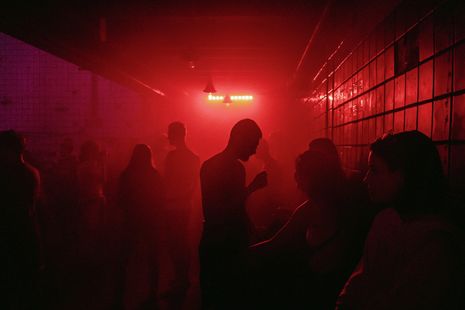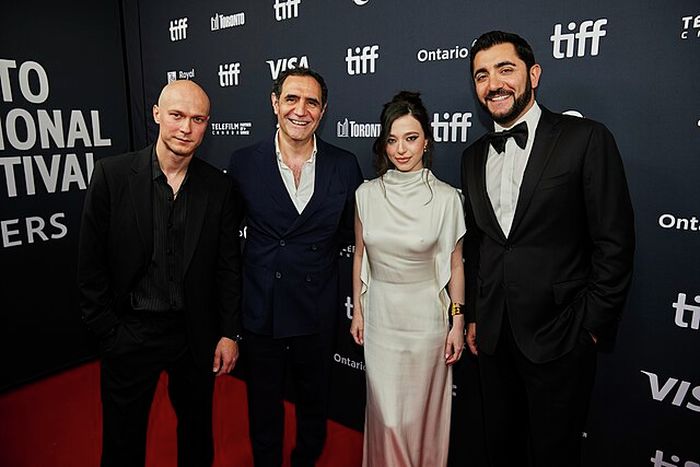Sebastian’s take on sex work is shallow
Salome Gakwaya explores how sex work is depicted in Sebastian, the latest film by director Mikko Makela.

Sebastian’s protagonist, Max, claims to want to uncover the modern sex worker in his writing; one who feels no shame, who enjoys his job, who exists in a post-internet world where sex work is like any other job. It’s a compelling premise, one that promises a nuanced and contemporary take on a historically misrepresented subject. However, Mikko Mäkelä’s film delivers a far more conflicted character, less radical, and a little more flat.
In the day, Max works freelance for a magazine, while also trying to break into the literary world with his own short stories. By night, he becomes Sebastian, a sex worker navigating London’s sex work scene through an app. Mäkelä chooses not to draw a clean line between these two personas, instead letting Sebastian bleed into Max’s life, most significantly as the subject of Max’s first novel. This blurring identity provides a rich concept, but the film never seems quite sure what to do with it; what could have been an insightful development of a very complicated character instead feels underdeveloped and overshadowed by the cinematography
“The result is a film that is visually explicit but emotionally muted”
Praised for its naive, uncensored, and vulnerable depiction of sex, The Guardian called it a “tender, thoughtful sexual odyssey”, and Sebastian certainly doesn’t hold back from graphic depictions of sex. London, too, is rendered with an unflinching eye; Mäkelä doesn’t shy away from the cold and harsh realities of the city. Yet despite these nods towards authenticity, Sebastian ultimately falls flat. For all its ambition and provocation, it rarely moves beyond the superficial. The result is a film that is visually explicit but emotionally muted.
Repetitive, insistent, and unnecessarily graphic, it felt like Mäkelä was more interested in making the audience react, than developing his principle character. Instead of progressing or deepening, the narrative feels stuck, content to provoke rather than illuminate, and one begins to wonder whether Mäkelä is interested in exploring the realities of sex work or merely exploiting them for aesthetic and critical appeal. There is a performative quality to the film’s so-called honesty, as though the director is more invested in appearing daring than in being honest.
“Repetitive, insistent, and unnecessarily graphic”
Cinema has always had a complicated relationship with sex work. From Belle De Jour (1967), to Pretty Woman (1990), and Moulin Rouge (2001), the depiction of sex workers on screen has rarely been straightforward. Too often, these characters have been romanticised, demonised, or reduced to symbolic placeholders in a director’s ideological sandbox. Rarely have these characters been granted the full complexity they deserve. Mäkelä’s claim to authenticity is welcome, but authenticity demands more than unfiltered nudity and moody close-ups. It demands character, clarity, and commitment.
This is especially stark in contrast with Sean Baker’s recent Anora (2024), which has recently won five Academy Awards in March. While both films centre on a young sex worker navigating their position with their work, and their aspirations for their life, Baker manages to infuse her story with a whole range of human emotions. While Anora is delightfully funny and thoughtfully sad, never letting its protagonist become a flat emblem of victimhood or empowerment, Sebastian is far more self-serious. And self-seriousness, here, reads as evasiveness: a refusal to do the hard, uncomfortable work of storytelling in favour of ambiguity.
Mäkelä seems to be striving for realism, but Sebastian lands in an uneasy middle ground. The film gives Max a lot of space, in some parts feeling more documentary than fiction, but in allowing this space, Mäkelä sacrifices depth. In the end, Sebastian continues with his sex work, but has reclaimed “Max” in a final embrace of his two lives merging. His book is published, his friendship with Amna recovered, and he turns into the camera and urges the audience to “ask anything”. Finally, we get a glimpse into a character that feels surprising, rather than a recycling of the same cycle of guilt, shame, and a desire to be noticed. This is the Max that feels more promising, one that could say something new.
Want to share your thoughts on this article? Send us a letter to letters@varsity.co.uk or by using this form
 News / Cambridge academics sign open letter criticising research funding changes22 February 2026
News / Cambridge academics sign open letter criticising research funding changes22 February 2026 News / University Council rescinds University Centre membership20 February 2026
News / University Council rescinds University Centre membership20 February 2026 News / Supporters protest potential vet school closure22 February 2026
News / Supporters protest potential vet school closure22 February 2026 News / Hundreds of Cambridge academics demand vote on fate of vet course20 February 2026
News / Hundreds of Cambridge academics demand vote on fate of vet course20 February 2026 Comment / A tongue-in-cheek petition for gowned exams at Cambridge 21 February 2026
Comment / A tongue-in-cheek petition for gowned exams at Cambridge 21 February 2026








